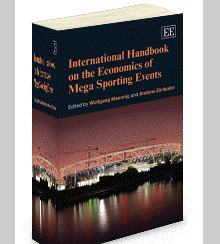A Sucker’s Bet in Sochi
After reading the International Handbook on the Economics of Mega Sporting Events, it’s hard to see how Russia will benefit from hosting the Winter Olympics.
(originally published by Booz & Company)Truth be told, Olympic medal counts aren’t all that interesting anymore. Before the Cold War ended, medals were a leading indicator of global might: If one country’s hockey team beat another one’s hockey team, that meant the winner’s political and economic ideologies were righteous. But these days, it’s less about how many gold medals a nation wins and more about how many gold bars it spends. And hey, by that measure, Russia is back on top! The Winter Olympics in Sochi are the most expensive in history, reportedly costing US$51 billion—more than every other Winter Olympics Games combined.
That’s impressive, and so are some of the stories that have dug into the breathtaking scale of “waste and corruption” at Sochi, like Joshua Yaffa’s cover story in Businessweek. But countries and cities have been going on Olympic-sized spending sprees to land mega sporting events for a long time. The perennial question remains: Is it worth it? For the answer, I turned to the International Handbook on the Economics of Mega Sporting Events (Edward Elgar Publishing, 2012), edited by professors Wolfgang Maennig (an Olympic rowing champion himself) and Andrew Zimbalist, and reissued in paperback in December 2013.
I can’t follow all the economic analysis in this book, mainly because the use of letters and other non-numeric symbols in the equations marks the border of my mathematical nether regions. But the conclusions of the impressively credentialed group of academicians and researchers who contributed to the thick—and rather daunting—collection are clear: “Most studies have found no statistically significant economic effect from hosting [the Olympics and other mega sporting events] and a few have found a negative effect.”
Most studies have found no statistically significant economic effect from hosting the Olympics.
Wladimir Andreff, professor emeritus at the Sorbonne University in Paris, goes further. After analyzing the Summer Games since 1972 and the Winter Games since 1980, he says, “Cost overruns, project revisions, delayed completion, financial deficit and debt are so widespread that it is easy to conclude that that the winner’s curse is more the rule than the exception.”
Interestingly, the only city to escape the winner’s curse was Los Angeles, which hosted the Summer Olympics in 1984. It was the only city to bid for the games after Montreal incurred heavy losses during the Summer Games of 1976. (In fact, it took Montreal’s taxpayers 30 years to pay off the debt.) LA’s solitary bid for the ’84 games leads Andreff to suggest that the International Olympic Committee should abandon its current auction-based bidding process, which encourages wannabe hosts to overpay for the privilege.
That’s not likely, however, nor is it likely that countries and cities will stop competing for the dubious honor of hosting the Olympics and other mega sporting events. After all, there are benefits to hosting that supersede financial considerations. For example, as Richard Tomlinson and Orli Bass explain in their essay in the International Handbook on the Economics of Mega Sporting Events, the BRIC nations will still use them as “coming-out parties” even though they “exacerbate poverty and inequality.” But even the benefits to national agendas, such as social cohesion and global legitimacy, have big risks attached to them. What happens if the opening ceremonies and attendant hoopla turn out to be a bust? What if the waste and corruption open the host to ridicule? Or worse, what if a tragedy occurs—say, a terrorist attack? It may be that Sochi will eventually provide some, though hopefully not all, the answers to these questions.



